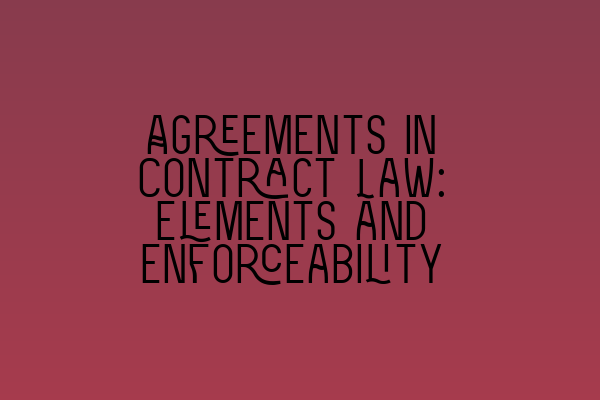Agreements in Contract Law: Elements and Enforceability
Contracts are the lifeblood of business transactions. They provide a framework for parties to define their rights and obligations, ensuring that everyone involved understands their roles and responsibilities. However, not all agreements are created equal. In order for a contract to be enforceable, it must meet certain elements and requirements.
In this blog post, we will explore the essential elements of a contract and discuss their enforceability. Whether you are a solicitor looking to deepen your understanding of contract law or a business owner seeking clarity on your legal agreements, this article is for you.
Before we dive into the elements of a contract, let’s take a moment to understand what a contract is. In simple terms, a contract is a legally binding agreement between two or more parties that creates an obligation to do or not do something. Now, let’s explore the key elements that make a contract legally enforceable.
1. Offer and Acceptance:
An offer is a clear and unequivocal statement of willingness to enter into a contract. It must be communicated to the offeree, the party to whom the offer is made. The acceptance, on the other hand, is the expression of agreement by the offeree to the terms of the offer. The offer and acceptance must be mutual and unequivocal for a valid contract to exist.
2. Consideration:
Consideration is something of value exchanged between the parties to a contract. It can be in the form of money, goods, services, or even a promise to refrain from doing something. Consideration shows that the parties have bargained for their rights and obligations, and provides the basis for a legal relationship.
3. Intention to Create Legal Relations:
In order for a contract to be enforceable, the parties must have an intention to create legal relations. This means that they intend for their agreement to be legally binding, and not merely a social or domestic arrangement. The intention can be expressed or implied from the circumstances surrounding the contract.
4. Capacity to Contract:
In contract law, capacity refers to the legal ability of a person to enter into a contract. Generally, anyone who is of sound mind and over the age of majority is presumed to have the capacity to contract. However, certain individuals, such as minors and those with mental impairments, may lack the capacity to enter into certain types of contracts.
5. Legality of Object:
A contract must have a legal purpose or object. It cannot be for an illegal activity or against public policy. If the object of the contract is illegal or goes against public policy, the contract will be deemed void and unenforceable.
Now that we have discussed the essential elements of a contract, let’s turn our attention to its enforceability. A contract is only enforceable if it meets all the necessary elements we have discussed. If any of these elements are missing or defective, the contract may be deemed void or voidable.
It is important to note that not all agreements need to be in writing to be enforceable. While some contracts, such as those involving the sale of real estate or goods over a certain value, must be in writing to be enforceable, other contracts can be formed orally or through conduct.
To ensure the enforceability of a contract, it is advisable to consult with a solicitor who specializes in contract law. They can help you draft and review your contracts, ensuring that all essential elements are present and that your interests are protected.
At SQE Contract Law, our team of expert solicitors can provide you with the guidance and expertise you need to navigate the complexities of contract law. We have extensive experience in drafting, negotiating, and litigating contracts, and are committed to helping our clients achieve their desired outcomes.
If you found this article helpful, you may also be interested in the following related articles:
- Navigating Legal Challenges and Pitfalls in Your Practice
- Barrister vs. Solicitor: A Comprehensive Comparison
- Exploring Different Solicitor Specializations: Finding Your Niche
- Embracing the Rise of Virtual Law Practices
- Navigating the Maze: Demystifying Ethical Responsibilities of Solicitors
For more information or to schedule a consultation, please visit our website or contact us directly. We look forward to assisting you with your contract law needs.
Disclaimer: The information provided in this article is for general informational purposes only and does not constitute legal advice. For legal advice tailored to your specific situation, please consult with a qualified solicitor.
